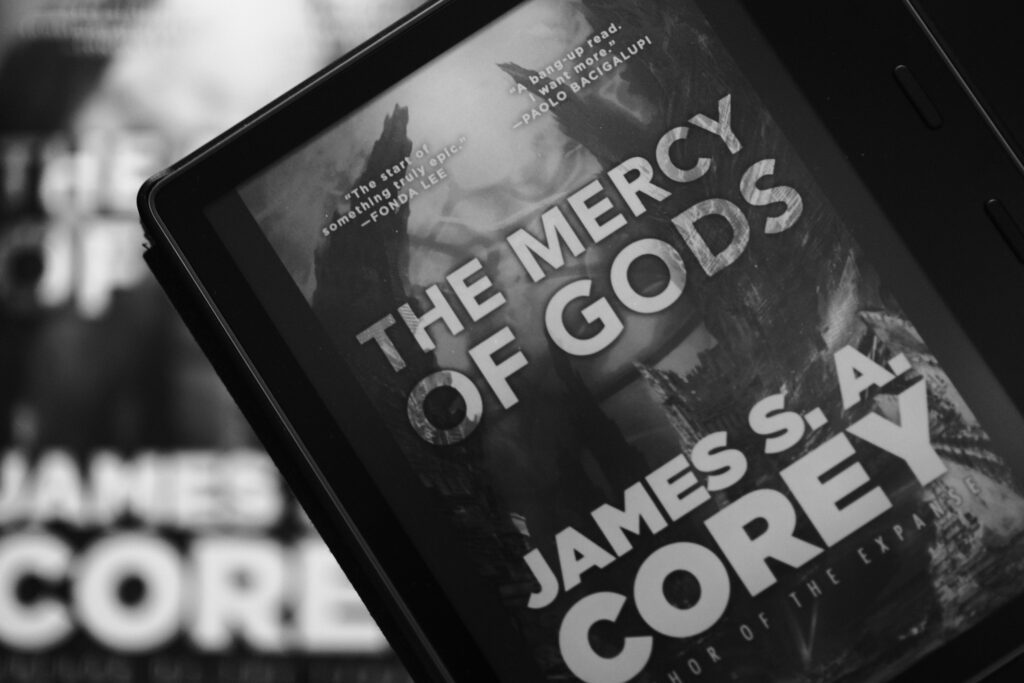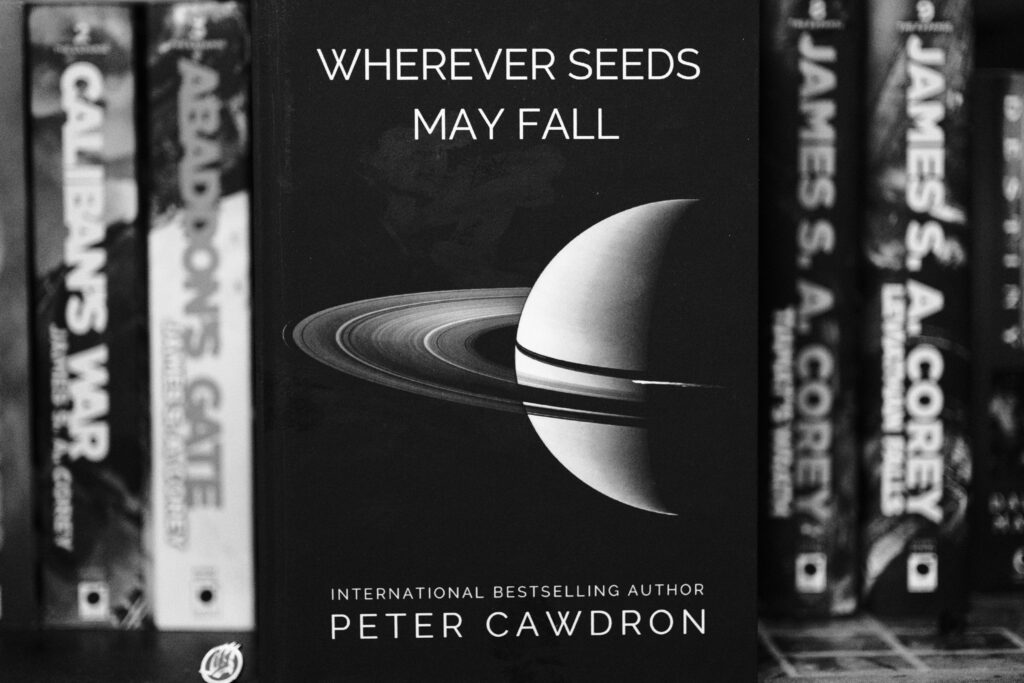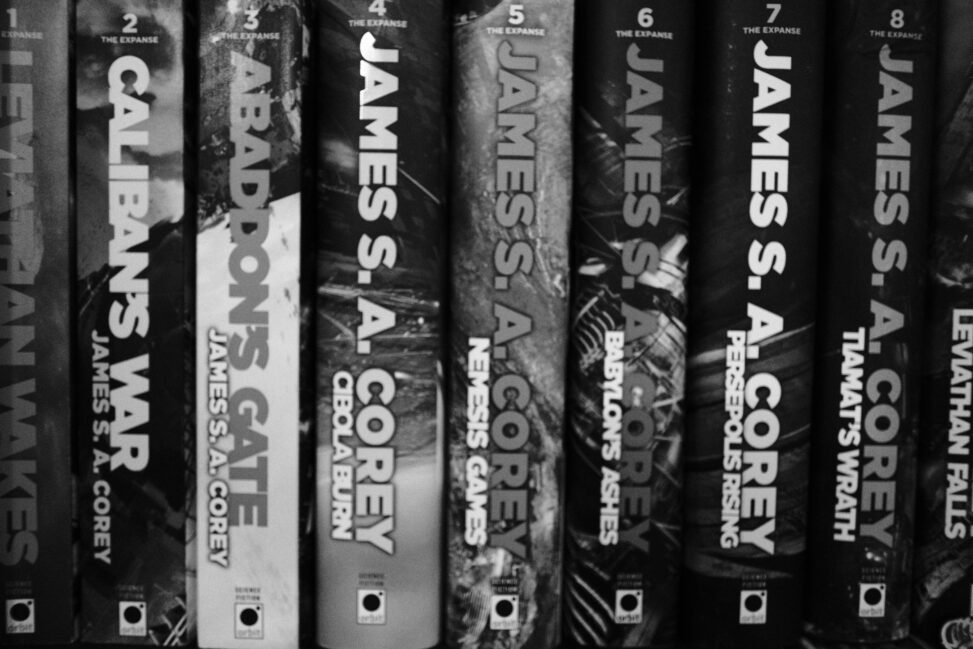2,194 words
Note: This review does not contain any spoilers but does cover some principle themes and events in the book, which will not impact your enjoyment of this novel.
Introduction:
Some of us were anticipating Daniel Abraham and Ty Franck’s (who write under the pen name of James S.A. Corey) new series of science fiction novels, and it took some of us by great surprise. I was one of the few in the various chat groups which was surprised. As one of the few who had read and absolutely adored all of the nine volumes of their previous series, The Expanse, and had read all the novellas at least twice, I felt a little pang of embarrassment in not knowing about this release. By reflex, I quickly ordered the e-reader version and the hardcover as I was finishing the last paragraphs of Timothy Garton Ash’s Homelands. Though it was well past ten at night, I was rejuvenated as though I had awoken from a solid nap on a firmly sprung hotel bed on a lavish vacation.
Many readers will come to this series with expectations from either or both of the novels or the television series from The Expanse. This can lead to some issues for the reader as they make their way through this new title.
The Expanse novels were a hit amongst readers for a multitude of reasons. First, the fictional universe was expertly crafted. Originally made for a tabletop game by Mr. Franck, his work was honed into nine truly magnificent novels with the help of Mr. Abraham.
Second, the two authors worked under Game of Thrones author George R.R. Martin, and The Expanse books and television series were falsely regarded as “Game of Thrones in space” by many. Most people made this connection because it was easy and because there were many characters and a few interweaving storylines – though not nearly as much as Mr. Martin’s work.
Lastly, what made these books an incredible joy to read were the characters, the well-built reality that was based on some loose leanings towards the ‘hard science fiction’ niche within the genre, but most importantly, the pacing. The pacing made most of the novels a breeze and a delight to read. While The Mercy of Gods succeeds on some of these fronts, it fails on a couple of others, and the reader needs to adjust their expectations going in. Once they do, this title will be satisfying and entertaining, yet a little worrying, but only if the reader lets it.
What Works: The People
The central characters of The Expanse were what emotionally drew us in and kept us invested in the entire series. As the books went on, the collection of central characters grew successfully based on the foundation set by the initial crew we met in the first volume’s opening pages. This is arguably the biggest strength of The Mercy of Gods. Its cast of central characters is less diverse than those in the previous series yet have a more grounded dynamic as a result. Whereas in the previous series, readers found themselves facing characters with mysterious and prolific backgrounds, here we are presented with a group of scientists that present rather ordinary backgrounds. The dynamic itself leads to one glaring problem that is endemic within both fantasy and science fiction genres, the recurrent lone savour motif, but it mostly works incredibly well.
As you immerse yourself in a few chapters, you will quickly find yourself invested in the characters’ well-being and the world in which they reside. The book takes place on a distant planet which humans have colonized, and we follow a core group of scientists just before an alien invasion of their planet. The book’s main character, Dafyd, is the junior member as a research assistant and is constantly reminded of this and his relative lack of competence – more on this later. The others include his other co-workers, his boss, who is conveniently dating his love interest, and some other characters who at first seem to orbit this group but may or may not be drawn into to be considered as one of them.
Just like the Protomolecule in The Expanse, this book succeeds in presenting an alien consciousness in the same manner, which is fascinatingly eerie and a joy to read. These two authors really know how to make a terrifying alien presence not only relatable but one that the reader will care about.
Readers of The Expanse will instantly recognize the quick pace at which the book advances. For those who like their science fiction books to be on the lighter side and to be an easy read, then you will find much comfort and quite a lot of entertainment here. If you are the kind of reader who likes to slow down and take your time with a title, well, then this is where this novel stumbles.

What Does Not Work: It’s All in the Details, or Rather the Lack Thereof
The largest complaint I had heard in person from those who read The Expanse was the change of pacing in the series’ seventh installment, Persepolis Rising. About three-quarters of those whom I spoke to chose to experience the series through audiobooks, while the rest did so on their e-readers. Almost every person admitted that they stopped reading the series halfway through this book, and this was an extreme shame for the series had a lot to offer and would return to presenting these readers with more of what kept them enamoured with the series. This seventh title presented a sizeable time jump and, as a result, had a slower pacing, which I suspect was increasingly challenging to follow along with while listening to it while driving to and from work.
This drop-off in readership may explain the biggest issue with this title and potentially how the pacing of this book was handled. The Mercy of Gods sacrifices world-building in order to keep the pace of the book moving along at an entertaining rate that does not require much effort. Aliens and other worlds that are encountered are barely given any descriptions, forcing the reader to rely on their existing mental library of science fiction to fill in the gaps. I frequently found myself unconsciously referencing the worlds from the earlier low-production sets from Star Trek for the worlds and the video game Stellaris for the variety of alien races that are thrust onto the reader.
This could be excusable if one categorizes this as a light read and does not grasp on to the false notion that The Expanse was hard sci-fi. However, this lack of detail very quickly makes this book extremely hollow. Very early on, the five-day period that the invasion took place was not glossed over, but it was omitted entirely. Lead characters would briefly describe what happened during these extremely traumatic days, only in passing later. The main characters are scientists and biologists who are incredibly observant by the nature of their training. Not having any number of them relay the information about the number of species present during the invasion and how the population was impacted is an inexcusable oversight. Later in the book, one chapter quickly gives the reader a one-paragraph description of some of the alien races, but this merely serves as filler as the main character interviews them as he tries to get a better grasp of his group’s circumstances.
The authors go to great lengths to impose how alien the aliens are and that any assumptions made of them and their intentions are fruitless. These are the few instances where the scientific training of the characters comes into play. There is one glaring omission which breaks basic logic, and it genuinely creates a fundamental flaw in the book. Early humans quickly noted how their actions impacted the lesser species around them, which they subjugated. This being anything from dogs, and especially plants. For instance, we learned quite early on that if we pruned plants and trees during their hibernation months, the organism would handle the stress better. This factor was overlooked by the invading alien species, who, at their level of advancement, would surely understand basic principles that we humans did thousands of years ago. This basic logic was ignored, causing irreparable trauma and damage to the humans (of which the trauma and damage itself were simply not covered during the five-day invasion), which would result in a fractured capacity for their newly subjugated humans to perform. Again, the pacing could be to blame here and was left out for effect, or the authors simply did not factor this in during the writing process. Evolution and the survival of the fittest played a prominent role in one chapter, and for this to be overlooked by an advanced civilization simply does not make sense.
Another complete oversight that this novel shares with The Expanse is how children and families at large are affected by such a catastrophic event. For example, currently, there are over 19,000 orphans in Gaza who have lost at least one parent since the start of the most recent conflict ten months ago.1 Again, this makes the books more entertaining and is something that most works of science fiction do not address on the large scale that these catastrophes are presented. I went back and read these sections again, and my initial feelings of being cheated felt familiar.
The lack of descriptions and details of essential events felt like when television shows and movies have important set pieces cut because of budgetary restraints. The entire novel felt like a late draft, waiting for the props and visual effects team to chime in once the final budget for the production was finalized. If this series of books is indeed being written for a television series, then this presents a problem for the readership, for they and their time are not being respected for the sake of making a product that will be more adaptable to other visual mediums.
This level of writing may have gotten a pass in The Expanse’s main novels, where no sentient aliens were present, but it does not here. Interestingly, the excellent novellas for The Expanse gave terrific details of alien life on worlds such as Laconia and went into great detail about the city of Baltimore in the future. None of that is done here, making the entire novel come off as unfinished.
However, this book presents one more glaring issue, and it is not alone in being guilty of this.
What Raises Genuine Concern
A friend asked me to edit his science fiction novel he had written about fifteen years ago. I hesitated due to not being an editor but begrudgingly agreed after the repeated rounds of pleading. That novel shared an element that this and almost every other fantasy/sci-fi title suffers from, and that is the lone saviour trope. Granted, the book which was thrust into my arms to edit was filled with Mary Sue incidents at every turn, and in general, the book was altogether a horrible exercise in masturbation since the author was transplanting himself into the hero’s role.
What my then-friend, the character that he wrote, and the main character in The Mercy of Gods all share is that they were bullied and considered to be of low social standing throughout their childhood and adolescence. In this book, Dafyd is consistently put down for his lack of competence by others, especially by the team leader. As the book progresses and the circumstances surrounding the group change, it becomes apparent that Dafyd’s usefulness advances to the point where he is considered their leader. The point at which I became disturbed by this was in an incident near the end of the book where Dafyd cements his alpha role by humiliating and injuring the team lead in front of everyone.
If you have read any other books in this genre, you have undoubtedly come across stories where the bullied turn their victimhood around and become the heroes in what is plainly an act of catharsis for the author. This theme lingered and grew as the book went on, and how it was punctuated gave me a genuine concern about which writer decided to write this specific incident. Both writers are brilliant people with staggeringly beautiful minds, and to think that either an individual or both shared bullying experiences that had led to writing such a passage as an adult filled me with sadness long after I put the book down.
Final Thoughts:
The Mercy of Gods is a highly entertaining read that the audience should approach with the correct expectations. First, the reader should not go in with the false narrative that these writers write hard sci-fi. The Expanse was advertised as such, but it merely used a solid underpinning of science and scientific assumptions before going into the fantastical without any scientific explanations. The grittiness of the television series helped propagate this notion, but as a reader, you should relieve yourself of any such notions before picking up this book.
Second, do not view the weighted experience of the previous book series and lighten your expectations. Other series, such as Adrian Tchaikovsky’s The Final Architecture books, or another science fiction book which was made into a well-received television series, Blake Crouch’s Dark Matter, all also suffer from such issues, such as details being sacrificed for the case of pacing, yet those titles have a strong following.

The duo behind James S.A. Corey have much to offer in this new series, especially to audiobook listeners who multitask while listening. Dedicated readers may face several instances where they feel their time is not respected, but this is not the case. This series is facing publication pressures that few have the privilege of being under, and an understanding approach before making any judgements is needed before you decide to pick up the book in the first place. If reading this book makes you hungry for a hard sci-fi book that centres around an invasion, I wholeheartedly recommend Peter Cawdron’s Wherever Seeds May Fall and its sequel, Generation of Vipers.
Time of writing: August 29th, 2024
- “‘My siblings have become my children’: the plight of Gaza’s orphans”, by Heba Saleh, Mai Khaled, and Malaikah Kanaaneh, 08/28/24, The Financial Times
